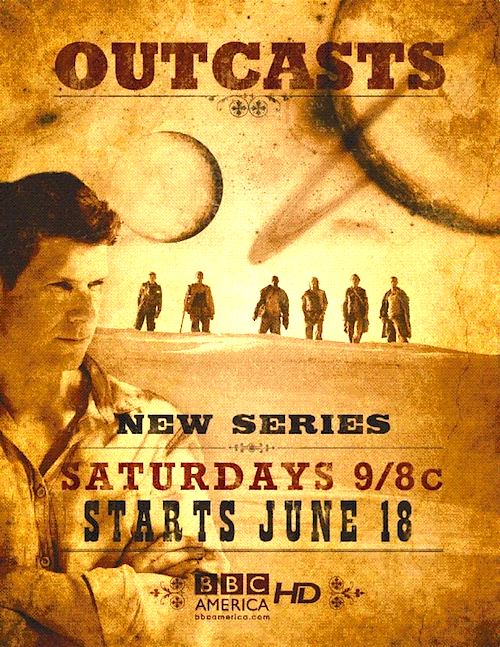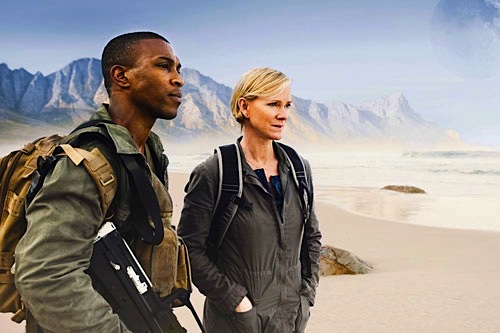By Joe Bendel. Life on Earth has become untenable. It is not so much environmental conditions, per se, but man’s own inhumanity towards man that is destroying the planet. With drug cartels taking over Europe and Chinese militarism running unchecked, war is the only terrestrial constant. As a result, many have evacuated in giant space arks. Those lucky enough will find refuge on the planet Carpathia (named for the ship that stopped to rescue Titanic survivors). However, the colonists of Forthaven will find their new home is not exactly an Eden in Outcasts, a new eight-episode science fiction series that premiered on BBC America this past Saturday.
Though still a relatively young community, Forthaven already has a tragic history. During its early years, a mystery disease called C-23 nearly wiped out all of its children. The steps President Richard Tate took to deal with the disease will haunt the geneticist turned political leader in future episodes. With post-C-23 birthrates perilously low, the arrival of a new ship from Earth is understandably big news. Forthaven needs to replenish its future generations. Bringing down the transport safely is Tate’s highest priority, but a domestic incident will have macro implications for the colony.
 Viewers quickly learn Carpathia’s dirty laundry. Tate had initiated and then canceled an ambitious genetic engineering program to create cloned humans, or “Advanced Cultivars” (AC’s). Presumed dead, those AC’s now live a nomadic existence outside Forthaven, which they most definitely hold a grudge against.
Viewers quickly learn Carpathia’s dirty laundry. Tate had initiated and then canceled an ambitious genetic engineering program to create cloned humans, or “Advanced Cultivars” (AC’s). Presumed dead, those AC’s now live a nomadic existence outside Forthaven, which they most definitely hold a grudge against.
After a strong start, episodes three and four get somewhat bogged down with the dour ethical implications of the AC program. Fortunately, Outcasts rebounds thereafter (no sense crying over spliced genes), as the nefarious Julius Berger, a prominent survivor of the transport ship (and both a New Agey religious zealot as well as a moral relativist), plots a coup d’état against Tate. Series creator Ben Richards establishes a suitable environment for intrigue, with the PAS officers (the cops in charge of internal security) remaining loyal to Tate, while the XP’s (the military Expenditionaries) are inclined to side with Berger. As if Tate did not have enough to worry about, he also learns in dramatic fashion there is a reason the Carpathia’s indigenous hominid life forms died out eons ago. As they say in science fiction, they are not alone.
Richard Tate is a great sci-fi character and the key reason why Outsiders works so well. Initially he appears to be a commanding humanitarian in the Jean-Luc Picard vein. Yet Tate is a darker, more complicated figure. Profoundly touched by tragedy, he is still able to make hard decisions and sleep relatively well at night. Character actor Liam Cunningham has the perfect hard-nosed gravitas for the part, as well as the sonorous voice that plays so prominent a role in episode one.

In a bit of a misfire, Hermoine Norris plays PAS chief Stella Isen, Tate’s closest ally, with frosty reserve – much like her character Carol Jordan in Wire in the Blood. That worked much better playing off the manic squirreliness of Dr. Tony Hill than the steely resolve of Tate. Conversely, Amy Manson and Daniel Mays are rather engaging as Fleur Morgan and Cass Cromwell, respectively, our primary POV PAS agents, who harbor a Tracey & Hepburn attraction to each other – but are also burdened with secret pasts.
Though the special effects of Outcasts are eminently presentable, the series is more concerned with social speculation and character development. Sadly, it appears that the first eight episodes are all we are getting, at least for the time being. While the conclusion offers a measure of satisfaction, it provides little closure, leaving Forthaven poised on the brink of a multi-front war for survival. Indeed, one could easily envision the story continuing in a hard-driving action film. It is worth hoping for. Indeed, Outcasts is one of the better conceived and executed science fiction series featuring a genuinely compelling lead protagonist. It is recommended for all sf fans and Anglophiles, and it debuted this past Saturday on BBC America.
Posted on June 20th, 2011 at 3:03pm.
